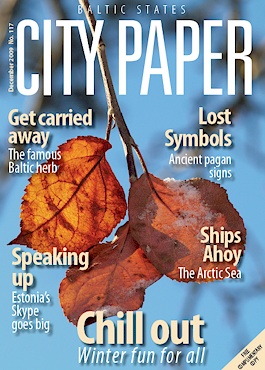'Tis the Season to be Jolly
 In the Baltics what is now the Christmas celebration directly corresponds with the pagan "Yuletide" winter solstice celebration season with centuries-old traditions that have their roots in pagan rituals. Interestingly, Estonia still retains its pagan word for these wintertime festivities – joulud, from the word jul (Yule).
In the Baltics what is now the Christmas celebration directly corresponds with the pagan "Yuletide" winter solstice celebration season with centuries-old traditions that have their roots in pagan rituals. Interestingly, Estonia still retains its pagan word for these wintertime festivities – joulud, from the word jul (Yule).
Traditions
Christmas celebrations in Estonia begin the 21st of December and end on January 6. During this period, Estonians work less, visit friends and family, and receive the declaration of Christmas peace from the Estonian president. Similar to Lithuanian Christmas Eve traditions, Estonians mark Christmas Eve with an abundance of food and preparatory cleanliness. In addition, while Lithuanians relegate straw to the table, signifying Christ's bed of hay, on which they eat their Christmas Eve meal, Estonians bring straw into the house and cover the floors. In Lithuania a plate with a candle marks the place setting of a family member recently deceased, or a glass of beer or kvass may be put in this place. After dinner, each guest draws a straw. The length of the straw represents the length of your life - if you draw a short straw, you'll die soon (Merry Christmas!) For all the girls, straws are drawn to see which girl will get married in the next year (shorter straws meant a shorter "single" life). In some regions, the leftover food is left on the table so that dead souls will have a Christmas Eve feast after the living have taken leave of the table. Across the border the Latvians believe that Father Christmas brings presents on each of the 12 days of Christmas starting on Christmas Eve. Latvians have also laid claim to the first decorated tree that started this Christmas tradition.
Food
The special Latvian Christmas Day meal is cooked brown peas with bacon sauce. All of the peas boiled at Christmas must be eaten by the morning, otherwise there will be a lot of tears shed in the New Year. In the last 100 years it has also become popular to bake gingerbread at Christmas, another tradition inherited from the Germans. The Estonians' popular Christmas food is the ubiquitous blood sausage or verivorst. Sometimes it is loaded with barley, and when salted and covered in sour cream, it is palatable. In Lithuania, Kucios are the special meatless dishes prepared for Christmas Eve. Twelve dishes represent the 12 Apostles. Winter dishes are typically served, including dried or cooked fish, pickled vegetables, and grains. Unleavened bread (Dievo pyragas – "God's cakes" or "Heavenly bread") is also served. This is an important part of the Lithuanian Christmas Eve tradition as it is imbued with the promise of future luck or can equally represent bad luck. The bread is passed around the table to every person – each person breaks off the bread from another person. The one who breaks off the largest piece will have good luck for the coming year. Being missed in the passing of the bread signifies extreme future misfortune.
Superstitions
As you can see Baltic Christmas celebrations are steeped in superstitions. Not only do you have to watch what and how you eat but bear these superstitions in mind:
Today people still hold a number of beliefs about salt. If food has too much salt added, the cook is in love.
ï€ If salt is spilled on the table or on the floor, then there will be a quarrel in the house.
When toasting, always look the other person in the eye. Cheers in Estonian is "Tervist", Latvian "Prieka" and in Lithuanian "I Sveikata."
Everybody knows that if you light a cigarette (or anything for that matter) from a candle, a sailor dies.
Never introduce yourself or shake hands over a threshold.
Don't place your bag on the floor - you'll lose money!
Don't whistle indoors - you'll inadvertently 'call little devils' to appear!
Don't sit at the corner of a table if you wish to marry soon. You'll have to wait seven years.
If a knife falls to the floor, it means you will soon have a male guest. If a fork falls, a female guest will visit. Spoons are inconsequential.
If you are walking beside a friend and you split to bypass a post, street-sign etc., you will soon have a quarrel.
If swallows are flying low to the ground it will soon rain.
Walking on manholes is bad luck, unless someone immediately knocks on your back once (obviously).
By Larisa Medene




